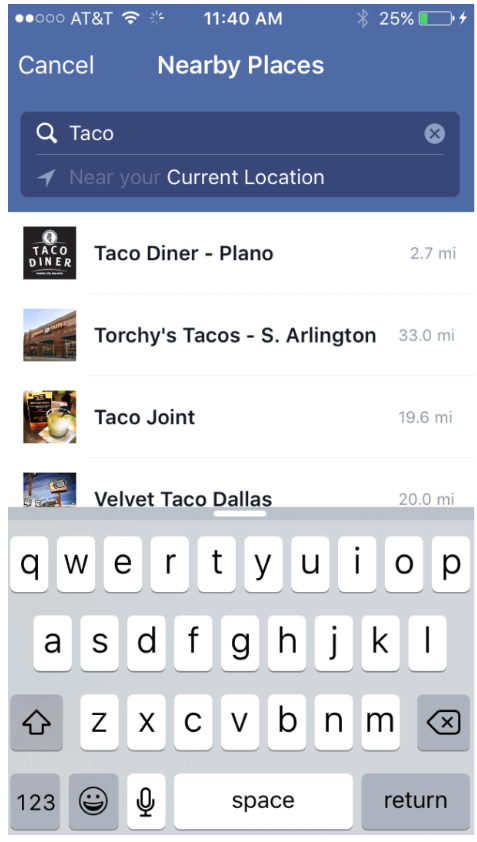It’s been said that more people are moving to social media as the preferred search method.
Instead of looking up a specific brand name on Google or Bing, web visitors are often starting their search where these brands are the most active.

Now is that actually true? Are users really searching first on Facebook before they ever land on Google?
Are People Actually Using Facebook as a Search Tool?
While users may not be querying Facebook for “5-star Italian restaurants near me” just yet, certain areas of search are already shifting to social media.
A key example of this is previous searches for current events are instead being filled by the trending section of Facebook. The Pew Research Center concluded that “44 percent of Americans get their news from the site”.
For some time now social media giants have crept in on the turf of search engines. In 2014 Mark Zuckerberg stated, “We’re not currently showing Web search results in Facebook Search because we’re focused on helping people find what’s been shared with them on Facebook.”
One of the biggest struggles for social media companies is compiling and understanding content posted by users. As they’ve grown, these social media platforms have gotten better and better at structuring this content into concrete data.
This allows companies like Facebook place the right content in front of the right users at the right time.
Does this sound all that different from what search engines do in how they create relevant SERPs? Should you be creating content for social media?
Just How Good is Facebook as a Search Tool?
Maybe, if you really tried, you could poke a few holes in my analogy here.
While there are a few key distinctions, as technology continues to advance and social media sites continue to understand users better the differences between social media and search engines will become smaller and smaller.
On top of offering very similar services as search engines, social media actually has a few key advantages. Search Engine Land is quoted saying:
Search results may be targeted using the unique profile that Facebook has on each user. Facebook profiles may include location, check-ins, content viewed, content posted, time of social activity, likes and interests, groups and of course, the user’s overall friend network.
That means search results are based not only on the intention of the searcher (search terms) but also his or her interests. Facebook knows its users incredibly well. Every click, every hover-over, every minute of engagement on an article—Facebook is tracking.

Because of this, Facebook is able to break down what you are interested in with an almost scary accuracy.
You know that news feed you see every day with funny cat videos and Tai Lopez memes?
[bctt tweet=”That’s not random. That’s analytics at its finest.” username=””]
That’s Zuck’s masterpiece.
This is how Facebook managed to their staggering $26.9 billion dollars from advertising in 2016.

The same precision Facebook takes to curating your newsfeed it applies whenever anyone uses its search function. Have you shown interest in a certain party or politician? They will likely be a top result if relevant.
A key note on Facebook search, it’s clear that the platform has a bend towards showing current events. News stories or upcoming events have an advantage here. This makes sense when you consider the intent of Facebook users. A keen marketer will take this insight and use it to his/her advantage.
Weaknesses of Facebook as a Search Tool
Ineffective at Capturing Intent
Google and other search engines have a distinct advantage when it comes capturing user intent. Social media is only able to give correct search results for simple queries where the intent is much more obvious.
Google, specifically, is incredible at understanding user intent.
This graphic shows what I mean:

While Facebook was able to interpret that I was in the mood for some tacos it wasn’t effective at helping me find the right restaurant to go to. For instance, notice how much the mileage distance varies between results.
Types of search queries which Facebook can accurately provide results for is very limited. It was able to tell that I wanted information on the keyword ‘Taco’, but unable to render more relevant results that did not have the keyword in the name.
[bctt tweet=”I wouldn’t drive 33 miles for a taco. Would you?” username=””]
Not Leveraging Localized Search
Given their mobile dominance, Facebook and all other major social media platforms have the ability to hyper-target content based on location, but almost all choose not to. Snap is a notable exception here.
If you’re using their app, social media knows where you are and how you’re engaging with their content. It could easily provide more relevant localized content to its users—likely even better than search engines. On top of that, they can use location push notifications when its users enter a certain area.
Say, for example, you walked into Target looking to buy a scarf. Facebook could send a popup to your phone with information on the latest Target coupons and discounts.
They have the ability to leverage localized search, so why don’t they?
This is a tricky one. The most notable reason why social media companies haven’t leveraged localized search is how careful they are not to come off as creepy or invasive to users. If you or I actually knew how much information these companies had about us it would make us more than a little uneasy.
Take Facebook for instance. Facebook knows all of your demographic information, knows what your what interests are, what type of media you like best, and everything you’ve ever liked or engaged with since you started your account.
So far, social media companies haven’t leveraged this information openly by providing localized search.
Conclusion
Social media is increasingly becoming a standard option in how users get their information. Over time we’ve seen social media begin to overtake search engine in a few key areas.
Among others, searches related to current events or brand specific are often done on social media.
We expect for social to continue to grow its role in search. It has many natural advantages over conventional search engines. As its technology improves it will prove important than ever to have a strong social media presence.
Subscribe to our newsletter to stay in the loop.
Error: Contact form not found.
To contact me directly you can reach me at [email protected].